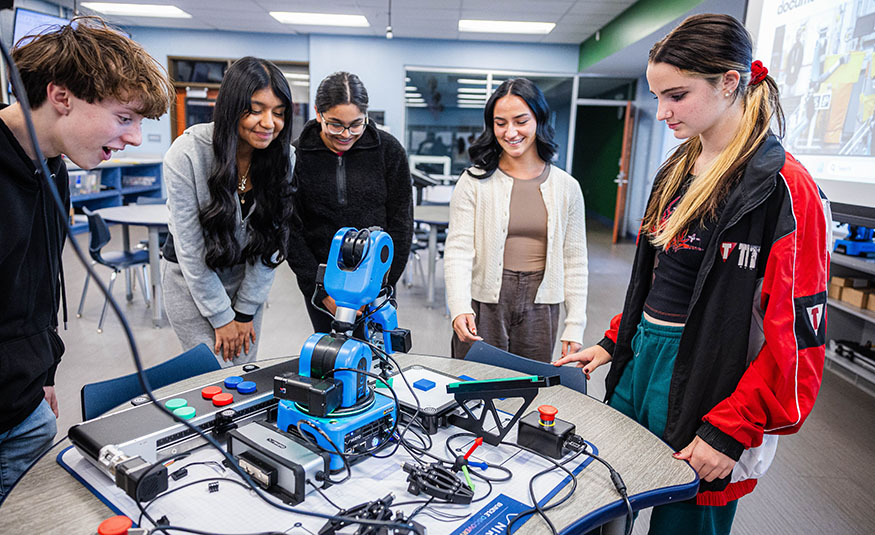New Jersey
Train disruptions for NJ Transit, Amtrak prompt another angry NJ delegation letter

3-minute read
Gateway Project includes new rail tunnel under Hudson River
The Gateway Project’s $18.4 billion first phase will make rail service more reliable NJ Transit and Amtrak riders between New Jersey and Manhattan.
Several members of New Jersey’s congressional delegation have again sent a letter calling on the U.S. Department of Transportation to get involved in the issues plaguing train travel for NJ Transit and Amtrak riders on the Northeast Corridor this summer.
The letter, sent to Transportation Secretary Pete Buttigieg on Friday, is at least the third he has received from officials in New Jersey seeking accountability over the repeated delays Amtrak and NJ Transit customers have experienced due to failing infrastructure.
“I’m sick and tired of a ‘Summer of Hell’ — year after year,” wrote U.S. Rep. Mikie Sherrill, who led the letter, co-signed with U.S. Reps. Frank Pallone, Robert Menendez, Josh Gottheimer, Andy Kim, Bonnie Watson Coleman, Bill Pascrell and Donald Norcross.
Story continues below photo gallery
“We need Amtrak to use the $6 billion we passed in the Bipartisan Infrastructure Law to repair these lines so NJ Transit commuters see fewer delays,” Sherrill wrote. “It’s time to get this fixed.”
Among the requests of U.S. DOT that were outlined in the letter:
- “Have Amtrak provide a schedule regarding how it intends to spend the funds appropriated for state-of-good-repair on New Jersey’s portion of the Northeast corridor”
- “More must be done in the interim to inform riders about outage plans, repairs, and other improvements affecting their daily commute. We ask that you urgently outline a plan to keep commuters fully informed of planned and unplanned disruptions.”
Despite the letters, there has been little direct communication with Buttigieg since the first congressional letter was sent June 25. The secretary was also copied on a letter New Jersey Gov. Phil Murphy sent to Amtrak CEO Stephen Gardner in May.
Rep. Menendez spoke to Buttigieg during a June 27 hearing of the Transportation and Infrastructure Committee, imploring the secretary to “treat this like the crisis that it is.”
“We’re hearing from our residents every day who don’t want to go to work, who don’t want to travel, who are worried about what child care looks like because there’s no reliability,” Menendez said.
Buttigieg said federal staff helping Amtrak assess causes
Buttigieg said Federal Railroad Administration personnel have been “on the ground” assessing the situation and are assisting Amtrak and NJ Transit in a joint review they are finalizing. The review is assessing why NJ Transit’s overhead train equipment is getting tangled with Amtrak’s power lines — the central cause of significant cancellations, delays and disruptions in April, May and June.
Those issues have not reoccurred in July, as NJ Transit and Amtrak have increased inspections, brought in third party assistance and placed cameras on top of trains.
A July 10 incident that was reported as “downed wires” was actually a rope that fell, and on July 21 wires that fell on the tracks were not Amtrak’s but PSE&G’s and had nothing to do with Amtrak’s infrastructure, the utility company confirmed.
Murphy said he has kept in close contact with Tony Coscia, Amtrak’s board chair, as the two agencies work to prevent further incidents.
Earlier this month, Amtrak applied for four federal grants that would help pay for upgrades to overhead wires, a substation replacement project and signal improvements, as well as replacing the Sawtooth Bridge, but those projects likely wouldn’t be completed for years.
Similarly, completion of the Portal Bridge replacement across the Hackensack River and construction of the Gateway tunnels, which would include wire upgrades, won’t be finished until 2026 and 2035, respectively.
Overhead wires, signals and substations throughout New Jersey were first identified for replacement 50 years ago, but $4.6 billion in overdue repairs and upgrades have built up over time.
Amtrak, according to its own documents, has adapted a “run-to-fail approach” instead of a long-term strategy that would have required consistent funding it doesn’t normally have. This has allowed the infrastructure to deteriorate. As a result, decades-old wires droop, causing them to fall or get tangled during extreme changes in weather.
Friday’s letter adds pressure to U.S. DOT and Amtrak to use the $6 billion in federal funding allocated specifically for the Northeast Corridor’s maintenance backlog.
“We were proud to secure this funding for precisely this purpose, and these funds should be used to address the problem right now,” the letter said.

New Jersey
Neighbors stunned as teen charged in fatal stabbing of N.J. mom in condo complex

A South Jersey mother who was fatally stabbed by her teenage son was described as quiet, kind, and as a dedicated caregiver.
Julissa Serrano, 49, worked as a home health aide for Journey Hospice and lived in the Meadowbrook Condos off Route 40 in Mays Landing.
Police said they responded to her home around 6:05 p.m. Saturday after a 911 call reported a juvenile with a knife.
Officers found Serrano with multiple stab wounds, and she later died at AtlantiCare Regional Medical Center.
Neighbors said the normally quiet complex was suddenly filled with police activity.
Mehmet Cicekli, who lives two doors down, said he was at work when the killing happened. He learned what occurred after seeing television news vans outside.
“I’m really shocked,” said Cicekli, 24. “She was quiet, and she was nice.”
One neighbor, who asked not to be identified, said she believed she saw the teenager escorted from the apartment in handcuffs.
“We didn’t find out until the next day,” the neighbor said of Serrano’s death.
The circumstances surrounding the incident remain unclear, but The Atlantic City Prosecutor’s Office announced they charged Serrano’s 17-year-old son with murder, possession of a weapon for an unlawful purpose and unlawful possession of a weapon.
He was taken to Harborfields Atlantic Youth Center pending his first court appearance.
Investigators have not said how he was identified as the suspect.
Serrano had worked for Journey Hospice for three years, regularly caring for patients facing death, said Denise Raymond, the company’s senior administrator.
“She was one of our home health aids,” Raymond told NJ Advance Media. “She was amazing — very loved by her coworkers, by her patients, by her patients’ families and we’re going to miss her.”
Serrano was named employee of the month at least once and earned positive feedback for her care, Raymond said.
“She was just a very positive, upbeat person to work with,” Raymond said. “You couldn’t be in a room with her without smiling.”
Journey Hospice is affiliated with Lutheran Social Ministries of New Jersey, a nonprofit organization under the Lutheran Christian Church that runs community outreach programs at 18 locations statewide.
The Atlantic County Prosecutor’s Office declined to comment on the case Tuesday.
New Jersey
Keefe | POST-RAW 11.24.25 | New Jersey Devils

NewJerseyDevils.com is the official web site of the New Jersey Devils, a member team of the National Hockey League (“NHL”). NHL, the NHL Shield, the word mark and image of the Stanley Cup and NHL Conference logos are registered trademarks of the National Hockey League. All NHL logos and marks and NHL team logos and marks as well as all other proprietary materials depicted herein are the property of the NHL and the respective NHL teams and may not be reproduced without the prior written consent of NHL Enterprises, L.P. Copyright © 1999-2025 New Jersey Devils and the National Hockey League. All Rights Reserved.
New Jersey
New Jersey vo-tech schools expand AI career pathways – NJBIZ

The basics:
- NJ vo-tech schools launch AI and robotics career pathways
- Mercer, Middlesex and Burlington schools partner with TCNJ, Kean and industry leaders
- Programs emphasize ethical AI use, industry credentials and real-world projects
- Districtwide initiatives train educators to integrate AI across all career programs
As artificial intelligence reshapes the global economy, New Jersey’s county vocational-technical schools are embracing a unique challenge. The schools are helping staff use AI as administrative and teaching tools as well as integrating the technology throughout their various career programs. Such broad awareness is essential among the schools that prepare students for a range of future career endeavors, from construction trades to the health sciences and even AI itself.
In early 2025, the New Jersey Department of Education awarded Mercer County Technical Schools and Middlesex County Magnet Schools each an “Expanding Career Pathways in Artificial Intelligence” grant. The funding was established to expand the state’s career and technical education (CTE) pathways to include new programs that blend AI and robotics.
Mercer County Technical Schools leveraged funding to partner with the Engineering and Computer Science departments at The College of New Jersey. The collaboration resulted in the launch of a three-course CTE sequence that is the foundation of the school’s new AI and Robotics program, with each of the courses offering students dual enrollment with TCNJ.
Charles Powell, assistant superintendent of curriculum and instruction at MCTS, said the grant supported a thoughtfully developed program that is “rigorous, relevant and directly connected to industry needs.” In addition to the professors at TCNJ, the school tapped industry experts to weigh in on the curriculum.
Curriculum development
“We simply could not have built a future-proof curriculum without deep partnerships,” Powell noted. “We collaborated with several incredible businesses and professionals who provided essential input on everything from course content to identifying industry-valued credentials (IVCs).”
Key partners have included: Moonbird.Ai; Nagy Group – MagicEdX.ai; QiMeta; and Croda, a global specialty chemical company, demonstrating AI’s broad reach beyond just tech companies.
“Professionals from these businesses helped us identify the critical knowledge gaps and future skill demands. Based on their feedback, we also selected the certifications students would pursue to ensure they graduate with credentials that are immediately valuable to employers,” Powell added.
In just their first year, MCTS AI and Robotics students can participate in the Certified Artificial Intelligence Prefect certification program. The course provides a strong foundation in AI, robotics, machine learning, deep learning, augmented and virtual reality, and Python programming. This certification equips students with the skills needed for future coursework, internships and emerging careers in AI-related fields. Students concurrently enroll in Computer Science Principles, where they explore computational thinking, data analysis, algorithms and programming, enhancing their problem-solving abilities through hands-on projects, digital portfolio creation and an in-depth understanding of computing’s impact on society.
Partners in AI
Middlesex County Magnet Schools also relied on strategic partnerships to develop a new AI and Robotics program. MCMS Director of Career and Technical Education Lee Neamand wrote the curriculum with feedback from HP, SHI and MRA International professionals. She also worked closely with Kean University’s Patricia Morreale, professor and chair of the Department of Computer Science and Technology, to focus the curriculum around the ethical and responsible use of AI.
They focused on five ethical principles: AI enhances rather than replaces human teaching and learning; educators and students maintain agency and control; AI use is transparent and explainable; student data is protected; and AI tools promote equity and access for all learners.
“AI should be a thought partner, never a substitute for critical thinking,” explained Neamand. “Using AI without critical evaluation perpetuates biases and inaccuracies. Students need both technical skills and ethical literacy.”
AI should be a thought partner, never a substitute for critical thinking.
– Lee Neamand, MCMS director of Career and Technical Education
Neamand said that the program would fail students if it simply taught them how to use AI tools and focused too much on tasks that will become automated. She emphasized, “We’re preparing students for the jobs of the future; we’re teaching them how to create AI, manipulate AI and solve problems using AI.”
Solving problems
As students progress through the program to complete four years of high school, they will finish with a capstone project that challenges them to identify a problem in the community and use AI to solve it in a systemic way. Neamand said this type of coursework can prepare students to make a real impact in their community. She offered the example of how AI tools have increasingly been used to detect cell deformity before humans can see it.
MCMS students will further benefit from opportunities throughout the program to learn from industry experts with support from an Advisory Committee that formed organically as Neamand sought input on the curriculum.
“Through these experiences, students will collaborate on real-world AI projects with business partners, allowing them to practice their technical skills and business application,” explained MCMS Superintendent Jorge Diaz. “This collaboration creates meaningful career pathways, connecting our AI-literate students with employers seeking their skills while ensuring all students, regardless of labels and zip codes, have access to emerging tech opportunities.”
Industry feedback
MCMS also will look to these business partners and its advisory committee to provide timely feedback on students’ knowledge and level of preparedness to guide program adjustments.
“Relevance is our biggest challenge moving into the future, but it’s one we planned for,” said Powell of Mercer’s AI and Robotics program. “We also established a CTE Program Advisory Committee for our Artificial Intelligence program with our business partners and TCNJ faculty. This Advisory Committee will meet on an ongoing basis to review new advancements in AI, share best practices and constantly provide recommendations to update the curriculum materials. By formalizing this feedback loop with both academia and industry, we ensure our curriculum is reflecting the state-of-the-art industry needs and preparing students not just for today’s jobs, but for the jobs of tomorrow.”
Not just for students
Powell said developing the new AI and Robotics program has prompted the district as a whole to examine its own use of AI. Starting last spring, MCTS implemented AI professional development for all instructional staff and recently completed a District Approved Policy on Acceptable Use.
“This ensures that the responsible and ethical use of AI is woven into every classroom, not just the CTE program,” Powell emphasized.
Burlington County Institute of Technology has emerged as a leader among New Jersey’s county vocational-technical schools in preparing staff for using AI professionally. At the start of this school year, BCIT launched a districtwide AI Task Force made up of educators, administrators, students and industry partners. Led by Director of Curriculum and Instruction Danielle Hartman, the group takes on a range of AI-related topics involving ethics, guidelines for use in the classroom, district policy development, and best practices for both administrative and instructional use.
“We want to help our colleagues leverage this technology as a thought partner and also a time-saver,” explained Hartman.
BCIT recently held a full day of professional development for staff led by Thomas Semko, a talent development expert, education consultant and adjunct professor at The College of New Jersey. This latest training focused on prompt engineering, guiding instructors on creating prompts using Chat GPT or Gemini to produce impactful learning opportunities for students.
Spanning industries
Hartman explained that a plumbing instructor may prompt AI to simulate a problem in the field that a student needs to troubleshoot. The instructor can input a plumbing codebook to give the AI tool specific information to pull from when both creating the problem and evaluating the student’s solution. Instructors may also prompt the AI tool to quiz students on an input codebook or safety manual.
BCIT Assistant Superintendent Eder Joseph said the district’s focus on training staff to use AI is strategic: Instructors must first become adept at using AI before they present it as another tool for students to use in their chosen career.
“Even masonry is using AI now to simulate what a job will look like before one brick is even put into place,” Joseph said.
He added, “AI will impact many of our career programs and also will change the programs we offer here at BCIT. Some careers may become obsolete, while others emerge. We’ll constantly evaluate our program offerings and how we teach these programs to best support our students.”
Ashanti Holley, superintendent of BCIT, added, “Artificial intelligence is redefining how the world learns and works, and leadership will determine whether that future creates broader access or deeper divides. At BCIT, we lead with intention and clarity so that technology expands possibilities, strengthens human potential and positions every student for meaningful success in a rapidly changing world.”
Jackie Burke is executive director of the New Jersey Council of County Vocational-Technical Schools.
-
Business1 week ago
Fire survivors can use this new portal to rebuild faster and save money
-

 World1 week ago
World1 week agoFrance and Germany support simplification push for digital rules
-

 News1 week ago
News1 week agoCourt documents shed light on Indiana shooting that sparked stand-your-ground debate
-

 Science3 days ago
Science3 days agoWashington state resident dies of new H5N5 form of bird flu
-

 World1 week ago
World1 week agoSinclair Snaps Up 8% Stake in Scripps in Advance of Potential Merger
-

 World1 week ago
World1 week agoCalls for answers grow over Canada’s interrogation of Israel critic
-

 Politics1 week ago
Politics1 week agoDuckworth fires staffer who claimed to be attorney for detained illegal immigrant with criminal history
-
Business1 week ago
Amazon’s Zoox offers free robotaxi rides in San Francisco
































